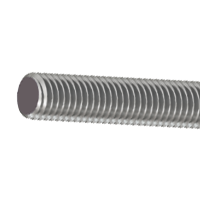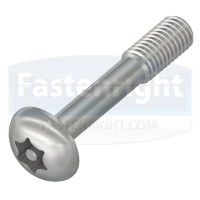Here at Fastenright, we want to ensure that your application doesn’t stumble by providing corrosion resistant fasteners for any industry that requires it. Not only do we want to ensure that you have the right material and finish, but the correct thread size and length too.
We’re able to provide fasteners in a range of materials that will differ in strengths and weaknesses, and finishes that will help improve these strengths. Multiple external factors can cause corrosion in fasteners, so ensuring that you’re choosing the right material and the right finish – if a finish is needed – is the perfect step towards a corrosion resistant fastener.
There is an extensive list of possibilities available, which we will cover below.
Popular Materials for Corrosion Resistant Fasteners
There are a number of popular materials that have anti-corrosion properties.
Stainless Steel
Both A2 and A4 stainless steel host corrosion resistant properties due to the high levels of chromium within the alloy. Stainless steel requires at least 10.5% chromium as part of the alloying materials for it to be considered stainless.
The corrosion resistance comes from the chromium, in fact, as when exposed to oxygen, the steel forms a layer of chromium oxide. The level of corrosion resistance can be improved by adding molybdenum, titanium, nickel, or copper to the alloy.
A4 Stainless Steel is known as marine grade stainless steel due to its exceptional corrosion resistant nature in salt water and is often found in constructions around water.
Titanium
Titanium has excellent stress corrosion cracking, high corrosion resistance, as well as a number of other corrosion resistant features.
Grade 1 Titanium hosts excellent corrosion resistance and often finds itself in chemical processing and chlorate manufacturing.
Grade 4 is widely known as the strongest grade of Titanium and is known more for it’s excellent resistance to corrosion, as well as good formability and weldability.
Duplex and Super Duplex
Duplex and Super Duplex Stainless Steels are becoming more and more common within the fastener industry for a number of reasons, namely greater corrosion resistance and resistance to stress corrosion cracking.
Whilst Duplex Stainless Steels are known more for their resistance to stress corrosion cracking, Super Duplex is the material to look to for general corrosion resistance.
Super Duplex Stainless Steels are used in a number of challenging applications, and offer excellent corrosion resistance – meaning that they’re less likely to be affected by damaging elements – which is why they can be found across the oil and gas industries.
Inconel
Like Titanium, Inconel has a number of grades that all host different properties and the majority of these grades are used frequently as fasteners or fixings alongside chemical exposure due to the anti-caustic corrosion properties the material has. They also host great resistance to high purity water corrosion or stress corrosion cracking.
Inconel 600, a nickel-chromium alloy, is incredibly resistant to a large number of corrosive elements. Inconel 617 is both corrosion and oxidation resistant and often found in chemical processing due to it’s resistance to a wide range of corrosive liquid.
Incoloy
Incoloy belongs to the same family of superalloys as Inconel, but both possess distinct properties. Incoloy has a higher ferrous content than Inconel, and is also available in a wide range of grades – all of which are great for corrosion resistant fasteners.
Each of the grades has different resistances to different corrosions, which we will list below:
Incoloy 800 contains nickel, chromium and iron and is resistant to high-temperature corrosions, including oxidation and carburisation. Incoloy 825 contains the aforementioned materials, with added molybdenum, copper and titanium – where the additions offer great resistance to stress corrosion cracking, crevice corrosion and pitting. Incoloy 832 resists pitting and hot salt corrosion.
Incoloy 901 has an iron base, and contains nickel and chromium, combining high-strength and corrosion resistance at elevated temperatures. Perhaps the most common grade for fasteners, Incoloy 925, imparts excellent resistance to stress corrosion cracking, oxidisation, pitting and crevice corrosion.
Other Materials For Corrosion Resistant Fasteners
Hastelloy is a nickel-molybdenum alloy, that like Inconel and Incoloy, is available in a wide range of grades that are all highly resistant to corrosion. It’s a superalloy, like the other aforementioned materials in Incoloy and Inconel, and has high resistance to uniform attack and localised corrosion resistance.
Zirconium fasteners are known for their resistance to some of the harshest environments, including hydrochloric acid, sulfuric acid and more. They’re ideal for acidic concentrations but not for ferric or cupric chlorides. They have been used for decades in dye manufacturing and chemical processing.
Tantalum fasteners are known their unmatched corrosion resistance within the industry, hosting all the properties of a metal and similar corrosion resistance to glass.
See our range of corrosion resistant fasteners
If you want to know more about the corrosion-resistant fasteners and materials we can provide, please give us a call.
Whilst we may not stock fasteners in some of the materials, we are able to offer them to you as a special.




